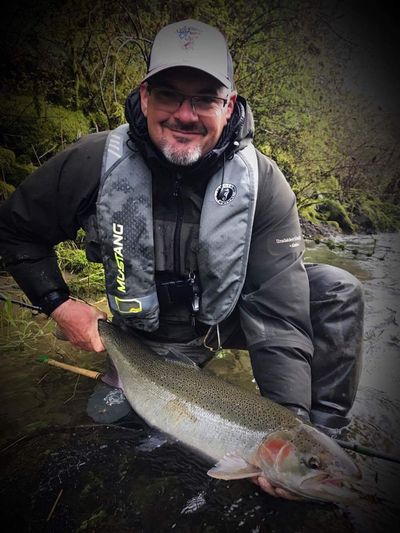Disabled vet offers peers therapy through fishing

Serving five foreign tours of duty during 15 years with the Army came close to killing Ryan Caldwell. Coming home to a medical retirement came even closer.
“I hit rock bottom,” he said before crediting fishing for helping him rise from the ravages of trauma, alcohol and the dregs of depression.
As he recovered and settled in Olympia, he founded a free fishing service for veterans called Got Your 6, a military term for “got your back.”
“For the first time in years, I had something to give,” he said.
Caldwell, 44, is well acquainted with the medical and psychological baggage soldiers bring home from active duty. His personal experiences ranged from Somalia to Bosnia and the Middle East. In addition to shrapnel in his body, he came back from Iraq with brain trauma.
“It took me five years to come out of it,” he said. “Fishing helped.”
Several groups across the country are organized around the therapy of taking disabled vets fishing and the soothing art of tying flies or rigging rods and lures. They’re all a little different and serve different needs and agendas.
There’s no shortage of need. Approximately 22 veterans commit suicide each day, Caldwell said. Roughly 20 percent of veterans suffer from traumatic brain injury and more than 35 percent of those who have deployed overseas are diagnosed with some type of mental health issue upon return, he added.
“About 50 percent of veterans suffering from post-traumatic stress disorder go untreated.”
Caldwell says he offers active duty military and veterans the chance to find physical and emotional healing through fishing trips and a custom rod-building program – nothing grandiose, but possibly life-changing.
“One fella accepted my offer to go fishing and then got all bent out of shape when he found out he had to pay for his own lodging for three days,” Caldwell recalled. “I said, ‘Man, I sleep in the back of my pickup.’ This is about going fishing, not being a celebrity.”
Caldwell describes trying to catch a bass or steelhead as the peaceful, relaxing therapy that filled in where hospitals couldn’t. “Fishing brought me back to earth,” he said. It rekindled my love for life.”
A day on a boat with Caldwell is about casting forward. “I just try to relate to others,” he said. “Our service is common ground, but I don’t talk about the military. I let them do it if they want to.”
He had just taken two vets fishing a few days earlier and he broke into a big smile describing the joy on the faces of the men when they caught fish.
“That’s the reason I used my life savings to buy a really nice boat, a StealthCraft Power Drifter,” he said.
Even though he was just taking vets out fishing for free, Western Washington guides turned him in two years ago for not having a license.
“I had a lot to learn,” he said. “I got the guide license, then I had to get a six-pack captain’s license. That might not be a big deal for most people, but I have cognitive problems from my head injuries. Studying for the test and passing it was one of the hardest thing I’ve ever done.”
At first, he offered the guiding service to vets on his own nickel without grants or government assistance.
Now he has nonprofit status and a board to oversee Got Your 6. He’s raising backup funding with an auction in Tacoma on June. 3.
“I’ve served more than 300 vets with the gift of fishing,” he said. “It’s a privilege. For many it’s just a good day out in nature, but about one out of three makes a connection to fishing.
“It’s amazing how something as simple as a fishing trip can be a first step towards healing.”
Info: gotyour6fishing.com